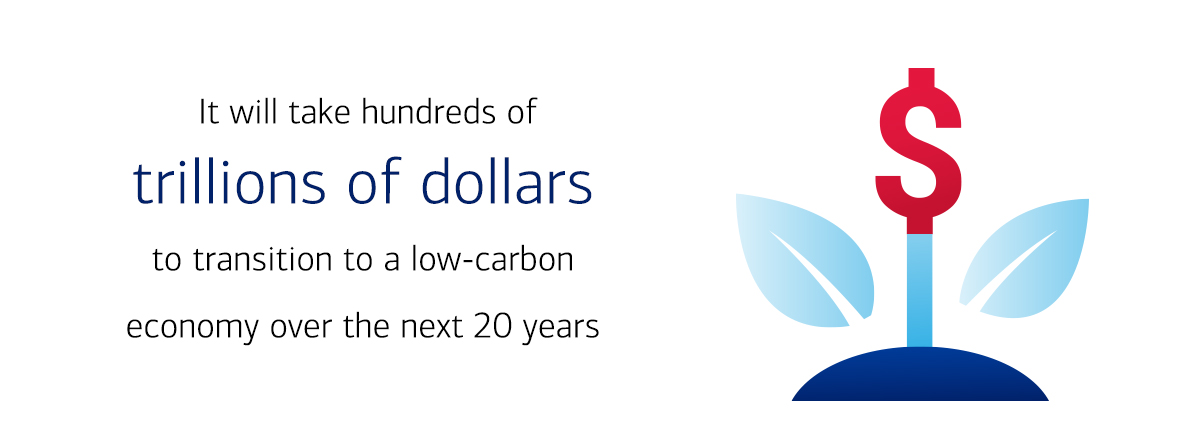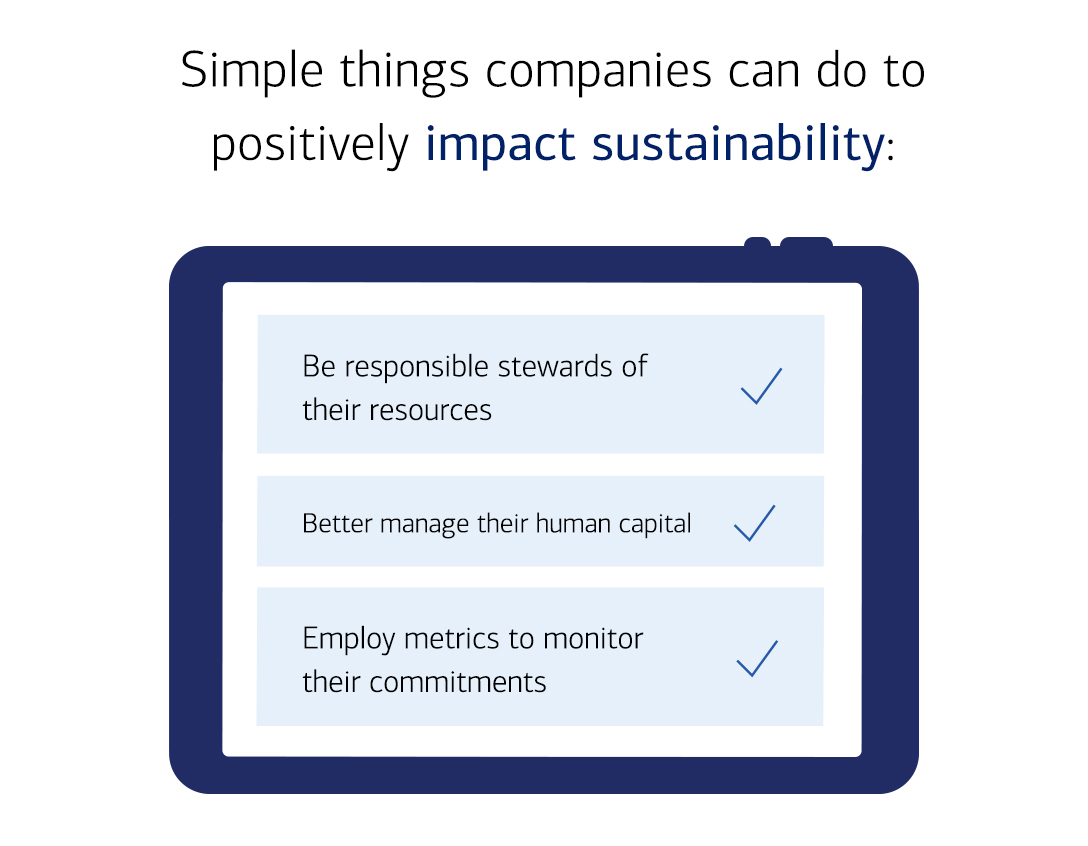The journey to sustainability: How companies are adapting to the green economy
Innovation and capital are two of the leading forces driving the transition to a low-carbon future.


10 minute read
Key takeaways
- More companies are incorporating sustainability into their business plans while also adhering to evolving regulation.
- A pragmatic way to think about the business case for sustainability “is as the intersection of planet, people and profits.”
- Bank of America is uniquely positioned to help companies achieve their long-term sustainability goals, including for green startups.
In late 2023, Bank of America’s Transformative Technology Group hosted a panel discussion about sustainability and the green economy. The three panelists, founders and CEOs of green tech and tech-enabled startups, all said one thing: Based on growing consumer and business partner expectations, as well as emerging government requirements, sustainability is moving from a “nice to have” to a must-have requirement for most businesses.
“Bank of America has made its own commitment to sustainability — because our customers and partners expect it, but also because we know it’s the right thing to do,” says Wyatt Smith, managing director of the Bank of America New Economy team.
The Bank’s commitment is a multipronged effort. The company is working to improve its own internal operations and practices, but also helping clients figure out how sustainability looks for them—and helping them implement sustainability best practices. The Bank also is contributing to building a more sustainable world by identifying and supporting green economy startups.
Says Smith, “Sustainability and the green economy are significant drivers of economic growth. It will take hundreds of trillions of dollars to transition to a low-carbon economy over the next 20 years. It’s important to start transitioning now. In 2021, Bank of America set aside $1.5 trillion to use by 2030 to help that transition.”

More green startups = More green innovation
Helping early startups in the green economy grow aids that transition. In addition to accelerating the overall U.S. economy’s transition, more green economy companies provide additional sustainability solutions for clients. In terms of investments, the Bank is actively “looking for companies that can solve the problems businesses have in getting to carbon-neutral. Our group works to find new solutions in the early stage, work with them to grow their businesses, so that they can provide the products and services our clients need,” said Scott Olmsted, Transformative Technology Group executive for Bank of America.
Currently, that focus has largely been on the more developed green economy segments: energy efficiency, renewable power — particularly wind- and solar-powered solutions — and the conversion of fleets of internal combustion engines to electric vehicles.
But Olmsted says there are other exciting but fledgling technologies the Bank is keeping an eye on. For instance, he points to the potential of hydrogen as an energy source in the supply chain. “We’re focused on the next-level power sources after solar and wind,” he says. Olmsted also mentions the airline industry’s transition to using sustainable aviation fuel. “Currently, that is not being manufactured quickly enough for airlines to take full advantage of it,” he says. The Bank sees an uptick in those types of situations, where there is an unmet demand for new energy sources. “For companies and new technologies like these, it will be a longer cycle until they get here and are more broadly available.”
“The biggest challenge is capital: How do these startups bring their ideas to fruition? Where can they find partners to help them do that?”
Olmsted says the Bank of America team’s goal “is to help make sure we have a constant supply of energy, since that is the one thing that might be scarce as we collectively go on this journey to a greener, cleaner economy.”
Bank of America works with tech startups to provide capital directly, but also helps identify potential investors — whether they are interested in offering debt, equity or a hybrid. Says Olmsted, “The biggest challenge is capital: How do these startups scale their businesses and bring their ideas to fruition? Where can they find partners to help them do that? How do they make their product or technology commercialized in a way that is useable for other companies that want to get to net-zero?”
“Beyond funding, green economy startups need assistance with liquidity strategies, leasing, global treasury and employee solutions,” Olmsted says
As Smith advises, “Know what you’re trying to solve for, and what you need. Know where capital might be — or work with your banker to identify sources. And engage with that banker early in the process.”
Taking the first few steps in this odyssey
“In addition to supporting green economy startups, the Bank is focused on helping other clients with their sustainability journeys,” Smith says.
“The first step for companies is awareness — making the business case for sustainability, and understanding how it affects your company’s business,” Smith says. He says one way to think about sustainability is as the intersection of planet, people and profits. Then the next step often is to think about simple things a company can do in its everyday processes to make an impact: being a responsible steward of resources, managing human capital, and employing metrics to monitor those commitments.

“Next, each company needs to figure out where sustainability should sit in terms of all its other priorities. Then, finally, a company can get to implementation of technologies, working to decarbonize its operations, and starting measurement of key sustainability markers,” Smith says.
The SEC is responding to investors who want more consistent and reliable information before committing capital. But companies are trying to respond to two sets of government regulations.
One challenge for all companies is that the sustainability space has been constantly changing. Companies are trying to respond to two sets of government regulations that are new and pending.
In March 2024, the SEC adopted rules requiring companies to disclose the effects of their operations on climate-related risks. The SEC said it was responding to investors who want more consistent and reliable information before committing capital. The proposed rules require companies to disclose information about their own climate goals and current oversight, but also require disclosure of former mitigations and losses. The rules were posted for public comment and have been challenged in court, so stay tuned.
Similarly, in 2023, the state of California — often a leader in green initiatives — passed two laws requiring companies that do business in the state to disclose greenhouse gas emissions, as well as climate-related financial risks. The laws have been passed by the legislature and signed by the governor, and are set to take effect in 2026, but business groups have challenged the laws.
Olmsted says although the carbon credit market is in the early stages of becoming a fluid market, it’s critical in the overall economy’s sustainability efforts. He also encourages companies to start moving on reducing their carbon footprints even if it takes time. “A company may have a net-zero commitment, but can’t make it right away. It will take a long time to transition. You can hit it earlier by going to market to buy your carbon credits. It’s not a long-term strategy, but a way to start to hit your goals,” he says.
Based on market trends and consumer sentiment, as well as these pending pieces of legislation, Smith says, “It’s time for every company to think about where they are on their own journey to sustainability.” He recommends talking with bankers and other financial partners to see what can be done now —because, he says, “Doing nothing is not an option.”
Finding the exit: Near-term volatility but long-term optimism delays exits
2025 will remain a tale of the “have nots” and the “have too much” players


